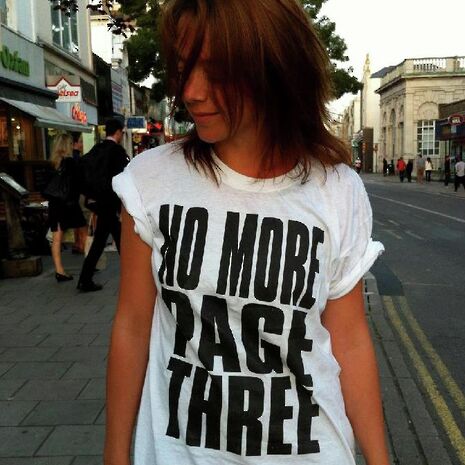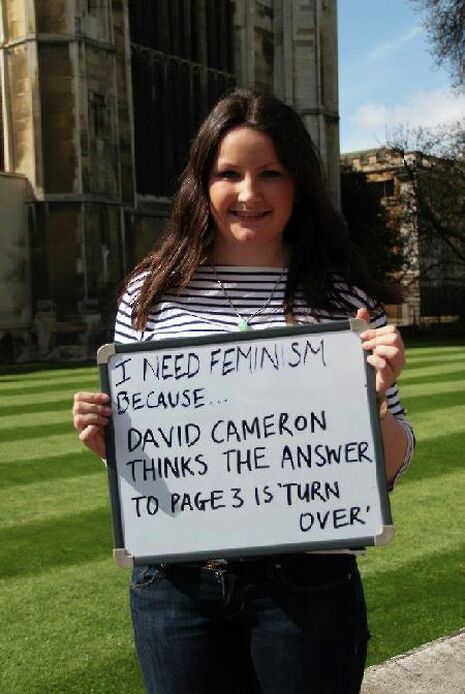A feminist social media revolution: No More Page 3
Martha Elwell interviews Lucy-Anne Holmes, the woman behind the campaign to end Page 3

During the London Olympics last year, actress and author Lucy-Anne Holmes bought a copy of The Sun. Flicking through the newspaper, she happily noted the parity of coverage between male and female sportspeople as well as the absence of the customary 'Page Three girl', which she supposed scrapped. But then she reached page thirteen: an enormous photograph of a young woman in her knickers.
The Olympic-inspired equality-bubble that she had briefly inhabited was burst, and Holmes was left with feelings of disbelief and anger. She decided to mount a campaign to rid The Sun of Page Three. “I felt such passion that I would wake in the night,” she tells me as she takes a cigarette break outside the Union after speaking at the Huffington Post feminism forum. “It was a bit like plunging in and not really knowing. At the start I was like, ‘I’ve got all this passion, can I be the only one?’”
She was not the only one. Within days the online petition had thousands of signatures and several people had contacted Holmes to ask how they could get involved. The campaign, which is about to celebrate its one-year anniversary, is building in momentum. Today the online petition reached 100,000 signatures and last month the Girl Guides made it their formal policy to support 'No More Page 3'. Student unions around the country, including the LSE Students’ Union and the Sheffield Students’ Union have passed motions to boycott The Sun while it continues to publish Page Three. On Monday CUSU followed suit.
In our interview Lucy-Anne Holmes describes the effect of Page Three as “powerful and damaging”. For Holmes, the most serious consequence of Page Three arises from its objectification and overt sexualisation of women: readers “see page after page of men doing all of this stuff, like running the country and achieving in sport, and then there’s an image of a woman standing there in her pants. It shows essentially that when women get to adolescence they’re there, their body is there, for men.”
Holmes is refreshingly candid. She speaks honestly about her own body image issues, and how her relationships have been affected by feelings of insecurity about her ability to please men. She tells me, “I think that women are incredible and powerful and awesome … And yet I think becoming a woman is a really unpleasant time for so many and fraught with insecurities and confusion and self-loathing and I really want to fight to make that not so.”

She argues that to simply ignore Page Three is not enough. The campaign routinely draws attention to the way that these sexually objectifying images promote a culture of sexual abuse and violence towards women. In an article for the Huffington Post earlier this year Holmes wrote, “We are all affected by Page Three whether we buy it or not, because we all live in a society where the most widely read paper in the country makes ‘normal’ the idea that women are there primarily for men’s sexual pleasure.” She adds, “‘If you don’t like it, don’t buy it’ doesn’t work, believe me, I wish it did.”
Given this view it appears surprising that the campaign’s aim is the voluntary removal of Page Three, rather than a legal ban. I put this to Holmes. “The idea of appealing to parliament didn’t really occur to me”, she replies. “And that might be because of my personal feelings at the time [of starting the campaign] of complete dislocation from the current government. Just feeling that these are men in suits talking in posh voices – I just don’t feel connected to them in any way.”
Previous attempts to introduce an outright ban have been unsuccessful. Holmes notes that Page Three remains legal “not for want of Clare Short trying and getting completely belittled by some Tory MPs and completely attacked by The Sun.” The Coalition government remains largely apathetic on the issue. When asked by ITN News last month whether he would support the removal of Page Three from The Sun, David Cameron’s response was that, “It’s the parents’ responsibility.” Conceding that Page Three is harmful to children, he urged parents to “Turn the page over.”
Holmes suspects that this attitude is a consequence of a larger pattern of intimidation by The Sun. As the country’s biggest circulation newspaper, The Sun wields considerable power so that to criticise it can be dangerous. Holmes believes that this explains why celebrity support for the campaign has not been forthcoming: there have been several supportive tweets from celebrities but no formal statements of endorsement. "At the end of the day it’s a paper that is famous for exposing high-profile people”, Holmes says. “Many of these high-profile people have got PR people who say: ‘don’t piss off the paper with the most circulation.’” In Holmes’s view, “everyone’s complicit”; family-oriented supermarkets that recognise the harmfulness of Page Three and would not put anything similar in their own publications regularly advertise in The Sun because of its extensive readership.
In this context of intimidation and Government indifference towards feminist issues, Holmes’s bypassing of the legislative path is understandable. Her common-sense approach of directly putting pressure on the newspaper seems more likely to succeed than previous campaigns, which have largely rested on the support of politicians and public figures.
In this perspective, 'No More Page 3' represents a new and potentially subversive means of protest. It cleverly bypasses the male-dominated institutions that have traditionally obstructed anti-sexist causes to engage with a wider pool of socially conscious Internet-users. Holmes has developed a highly inclusive campaign that engages with supporters and critics alike through Tumblr, Youtube, Twitter and Facebook.
It is the way in which Holmes and her small team of volunteers have utilised social media that is truly impressive. Their approach is to stimulate a conversation and to encourage individuals, rather than directing people to take action. The campaign centres on the sharing of women’s experiences of body issues and sexism to create a virtual community committed to the cause. Holmes says, “there’s been loads of beauty in it in terms of people not just signing the petition but writing an amazing Blog that will make you laugh or make you cry it’s so honest. Or writing a poem, or a song – really using their passion or their creativity to get the message out.”
I end our interview by asking Holmes whether she thinks the campaign will ultimately succeed. “Yes. I really do.” And I am inclined to agree.
Lucy-Anne Holmes addressed the Cambridge Union Society on Monday 29th April as part of a panel discussing the question, “What does feminism mean to me today?” Martha Elwell is a Features editor for Easter Term 2013.
 News / Hundreds of Cambridge academics demand vote on fate of vet course20 February 2026
News / Hundreds of Cambridge academics demand vote on fate of vet course20 February 2026 News / Judge Business School advisor resigns over Epstein and Andrew links18 February 2026
News / Judge Business School advisor resigns over Epstein and Andrew links18 February 2026 News / University Council rescinds University Centre membership20 February 2026
News / University Council rescinds University Centre membership20 February 2026 News / Petition demands University reverse decision on vegan menu20 February 2026
News / Petition demands University reverse decision on vegan menu20 February 2026 News / Caius students fail to pass Pride flag proposal20 February 2026
News / Caius students fail to pass Pride flag proposal20 February 2026










